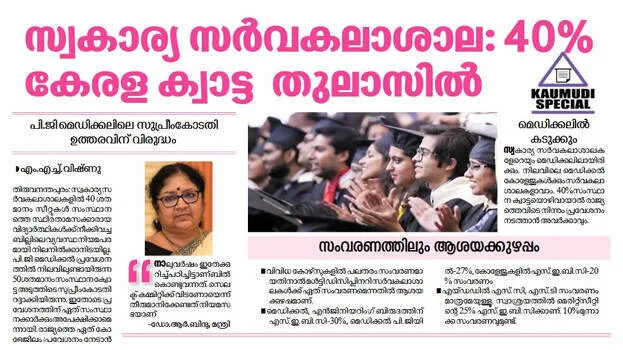

THIRUVANANTHAPURAM: The Assembly Subject Committee has expressed concern over the validity of reserving 40% of seats in private universities for students who are permanent residents of the state. 40% of the total seats in universities are state quota. Reservation will be applicable only to these seats. The report presented in the assembly yesterday pointed out that this quota may not be legally valid in the context of the Supreme Court's order that location of residence should not be applicable for admission and that it will lead to legal battles in the future.
If the 40% quota is cancelled, students will be denied the reservation benefits and educational opportunities they deserve. On February 21, 'Kerala Kaumudi' had reported that the 40% Kerala quota is hanging by the balance. The Supreme Court has ordered that reservations in states must strictly follow the constitutional norms. The report also points out that the court has cancelled the 50% state quota in PG medical. Since the current medical colleges can become private universities, if the 40% quota is abolished, admissions can be made from anywhere in the country. The reservation for backward classes is different in various courses. It is also unclear what kind of reservation system multidisciplinary universities should follow. Abid Hussain Thangal, T.V. Ibrahim, and Rahul Mamkootathil demanded in the subject committee that legally valid provisions be included. A decision on this matter may be taken when the bill comes up again in the assembly on the 24th.
Fee benefit?
Although the private university bill has a provision for fee concession and scholarship determined by the government for the Scheduled category, this benefit is not available to backward and minority students. The fees in self-financing medical and engineering colleges are determined by a committee of retired High Court judges. However, no matter how much fee is charged in private universities, the government or the courts cannot interfere. The subject committee also pointed out that this will lead to the denial of educational opportunities to backward and poor students.
Previous experience required